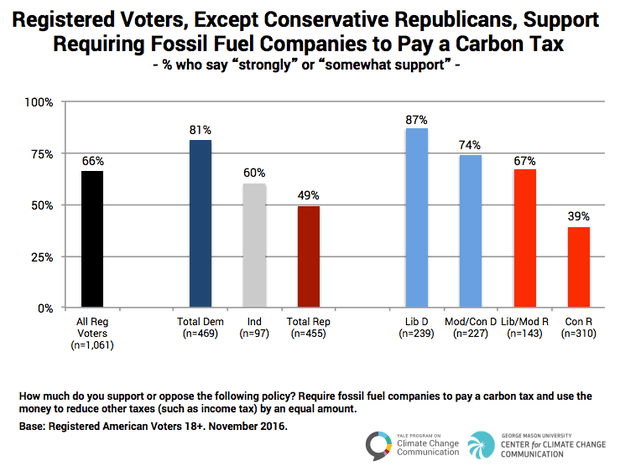What if, just work with me here, instead of passing a hugely unpopular HC bill in the dead of night, the GOP tried to do something popular?
What do ExxonMobil, Stephen Hawking, the Nature Conservancy, and Ronald Reagan’s Secretary of Treasury and Chief of Staff have in common? All have signed on as founding members to the Climate Leadership Council, which has met with the White House to propose a revenue-neutral carbon tax policy.
The group started with impeccable conservative credentials, bringing on cabinet members from the last three Republican presidential administrations (Ronald Reagan, George HW Bush, and George W Bush): two former Secretaries of State, two former Secretaries of Treasury, and two former chairmen of the President’s Council of Economic Advisors. It was founded by Ted Halstead, who explained the group’s proposed policy in a TED talk:
Some of the world’s brightest scientific and economic minds have since become founding members, including Stephen Hawking, Steven Chu, Martin Feldstein, and Lawrence Summers. So have ExxonMobil, BP, and Shell. But it’s not just the oil industry joining the call for a carbon tax; GM, Proctor & Gamble, Pepsico, and Johnson & Johnson are among the major companies signing on. As have environmental groups like the Nature Conservancy.
Citizens’ Climate Lobby, republicEn, the Niskanen Center, and the Weather Channel are among the Climate Leadership Council’s strategic partners. It’s an impressively diverse and influential group. The proposed policy is similar to that of Citizens’ Climate Lobby, calling for a rising price on carbon pollution with 100% of the revenue being returned to taxpayers via regular rebate checks. Research has shown that this policy would create jobs and stimulate the economywhile quickly and affordably reducing carbon pollution.
It should be a no-brainer for Republican policymakers. Over the past five months, they’ve exclusively pursued unpopular policies; particularly a health care bill with just 31% support that the GOP crafted in secret because party leaders thought it would be stupid to let Americans see their unpopular plan. As conservative columnist Ross Douthat put it:
And climate policy is popular. Just 29% of Americans support Trump’s withdrawal from the Paris climate treaty while 46% oppose it, and 79% say the US government should address the climate problem. 75% of Americans support regulating or taxing carbon pollution, including 62% of Trump voters. About half of Republicans support a revenue-neutral carbon tax.

Survey results showing partisan support for a revenue-neutral carbon tax. Illustration: Yale and George Mason Universities
Moreover the American government is legally required to establish regulations or policies to cut carbon pollution. The Trump administration has acted to unwind all of President Obama’s climate policies, but Republicans will eventually lose that battle in court. Inaction is simply not an option – it’s against the law – and so the GOP should be looking for the most palatable policy solution. That’s a small government, free market, revenue-neutral carbon tax.
However, the most conservative voters (i.e. the Republican base) have the lowest support for this (or any) proposed climate policy. And the Koch brothers and their vast network of allies – who have essentially bought many Republican policymakers through political donations – squarely oppose all climate policies. Those two factors likely explain why 22 oil-funded Republican senators encouraged Trump to withdraw from the Paris climate treaty, while very few of the party’s politicians objected to that stupid, historically irresponsible move. Instead of looking for solutions to the existential climate threat we face, they’re stuck in denial.
There are glimmers of hope within the Republican Party. In addition to the conservative elder statesmen, thought leaders, and oil companies joining the Climate Leadership Council, 21 House Republicans have joined 21 Democrats on the rapidly growing bipartisan Climate Solutions Caucus. But while they represent the preferences of the majority of Republican voters, among GOP members of congress, they’re still in the vast minority.
The current party leaders are also a lost cause. Trump stupidly withdrew from Paris at the urging of Mitch McConnell, and cabinet members like Ryan Zinke and Rick Perry have recently made headlines for their blatant denial of long-established climate science. The GOP’s forward-thinking climate realist policymakers won’t outnumber its science-denying, coal-loving, faux-masculine political leaders anytime soon. The only way the party will join us in the 21st century is if American voters make the 2018 and 2020 elections a climate referendum.
Posted by dana1981 on Friday, 23 June, 2017
 |
The Skeptical Science website by Skeptical Science is licensed under a Creative Commons Attribution 3.0 Unported License. |